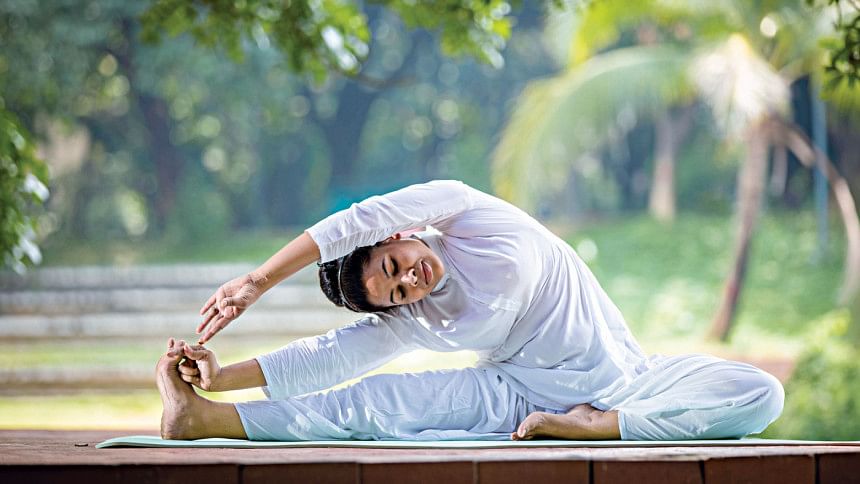Ancient wisdom for modern wellness The enduring relevance of yoga

With its emphasis on mindfulness practices and physical stretches, Yoga — an ancient practice born in India and practised by sages and yogis for thousands of years — is still as relevant in our modern times as it was back then, and can offer solutions to many of our contemporary health challenges.
Reema Islam, a consultant who works in the development sector, is a regular yoga practitioner and acknowledging the benefits of yoga, stated, "I practice yoga regularly because it suits my life. Thanks to yoga, I don't feel stiff or lethargic."
Islam explained that people who are in their 40s like her suffer from numerous age-related problems. So, it is vital to increase the body's flexibility. "Nowadays, due to our unhealthy lifestyle, we encounter issues such as muscle soreness or injury. If you keep doing yoga, you can easily avoid these problems."
From the classical version outlined in Patanjali's Yoga Sutras emphasising the eight limbs of yoga to the introduction of Hatha yoga, which brought more focus to the physical aspects, yoga, as a practice, has constantly adapted to meet the changing needs of its practitioners.

Fast forward to the 21st century, yoga still seamlessly integrates into our modern lives, offering a sanctuary from the fast-paced world we live in. It encourages mindfulness, a trait that is greatly needed in today's digital era, where distractions are constant.
Dipti Auroni, a music practitioner, started practising yoga when she was 16. She is a school teacher now, and allocates a certain period of her time to yoga. "Given the pace of our modern lifestyle, it is very easy for us to get restless. Yoga helps me to maintain my inner calmness amidst the chaos. For me, it is a necessity, as through this practice, I can nurture my awareness and balance."
Imagine a young professional, overwhelmed by the fast-paced corporate world, finding solace in the quietude of a yoga studio. The deep breaths of Pranayama and the calmness of meditation act as an antidote to her anxiety, reducing stress hormones and bringing a sense of peace. Or, picture a man battling obesity and the looming threat of diabetes, discovering not just an exercise regimen in yoga but a new way of life. The asanas strengthen his body, improve his cardiac health, and regulate blood sugar. So, the adaptability of yoga makes it a protagonist in our journey towards health and well-being, proving that ancient wisdom can combat contemporary ailments!

Shazia Omar is a yogini and co-founder of Dhaka Flow, a wellness movement.
Omar said, "Yoga is still important for our well-being because it is preventative, unlike symptomatic treatment. Yoga is a mind-body practice that encourages practitioners to develop a deeper understanding of their bodies, leading to better health choices and lifestyle changes. "Yoga is practised worldwide. We need to be aware of its benefits. It has become more accessible now — for example, Dhaka Flow offers free yoga classes on weekends at Justice Shahabuddin Park. Nevertheless, anyone can learn yoga under the guidance of a good teacher. Once you have learned it, you can practice it on your own. It is a small-time investment that can benefit you for a lifetime."
Perhaps, the most beautiful aspect of this story is the harmony yoga creates between mind and body. As oftentimes, we find ourselves split between physical health and mental well-being, yoga sings a song of unity. It teaches us to listen to our bodies, understand our emotions, and make choices that lead to a holistic sense of health.
Eliza Chowdhury, founder and yoga teacher at Eliza's YogArt, Yoga and Wellbeing Center, sheds light on the transformative power of yoga. According to Chowdhury, yoga can be particularly beneficial for individuals struggling with asthma and other health issues. This improvement, she explains, is likely due to yoga's ability to enhance posture and open the chest muscles, thus facilitating better breathing.
According to a study conducted by Johns Hopkins University, USA, yoga can significantly improve cardiac health, reduce symptoms of asthma and arthritis, and aid in weight loss and quality sleep.

Other studies have shown its invigorating effect on mental and physical energy, improving fitness and reducing fatigue. So, no matter how ancient this practice is, yoga has stood the test of time – helping us achieve fitness in modern times.
The sage, Patanjali, often considered the father of yoga, codified the practice in his treatise, the Yoga Sutras, offering a philosophical guide to mastering the mind, body, and spirit. Centuries later, the asanas (physical yoga postures or poses) and Pranayama (the practice of conscious breathing exercises), can help us find solace and balance in our busy lives, where most of the time, we stay chained to our desks.
Whether it is on social media or other platforms, we see many celebrities and influencers practising and promoting the benefits of yoga in maintaining a healthy lifestyle. Hence, yoga — a practice mentioned in Rigveda centuries ago — is still as popular as it was during the ancient times when sages and spiritual practitioners used it to attain longevity.
Steeped in history, yoga has not only adapted to modern needs but has become an essential tool in our quest for a balanced life. This ancient practice transcends time, proving that some solutions to our current health and lifestyle challenges have been with us for centuries.

Photo: Eliza's YogArt, Yoga and Wellbeing Center

 For all latest news, follow The Daily Star's Google News channel.
For all latest news, follow The Daily Star's Google News channel. 



Comments